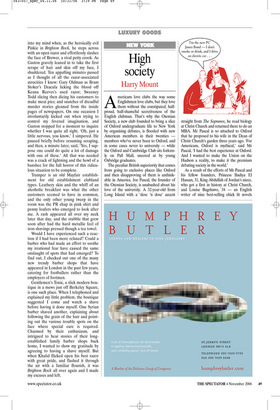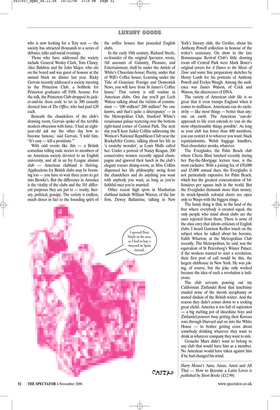High society
Harry Mount
Americans love clubs the way some Englishmen love clubs, but they love them without the constipated, halfproud, half-shameful secretiveness of the English clubman. That’s why the Oxonian Society, a new club founded to bring a slice of Oxford undergraduate life to New York by organising debates, is flooded with new American members in their twenties members who’ve never been to Oxford, and in some cases never to university — while the Oxford and Cambridge Club sits forlornly on Pall Mall, sneered at by young Oxbridge graduates.
The peculiar British superiority that comes from going to exclusive places like Oxford and then disapproving of them is unthinkable in America. Joe Pascal, the founder of the Oxonian Society, is unabashed about his love of the university. A 32-year-old from Long Island with a ‘dese ’n dose’ accent straight from The Sopranos, he read biology at Christ Church and returned there to do an MBA. Mr Pascal is so attached to Oxford that he proposed to his wife in the Dean of Christ Church’s garden three years ago. ‘For Americans, Oxford is mythical,’ said Mr Pascal, ‘I had the best experience at Oxford. And I wanted to make the Union on the Hudson a reality, to make it the premium debating society in the world.’ As a result of the efforts of Mr Pascal and his fellow founders, Princess Badiya El Hassan, 31, King Abdullah of Jordan’s niece, who got a first in history at Christ Church, and Louise Bagshawe, 34 — an English writer of nine best-selling chick lit novels who is now looking for a Tory seat — the society has attracted thousands to a series of debates, talks and social evenings.
Those who have addressed the society include General Wesley Clark, Tom Clancy, Alec Baldwin and Sir John Major, who sits on the board and was guest of honour at the annual black tie dinner last year. Ricky Gervais recently addressed a society meeting in the Princeton Club, a bolthole for Princeton graduates off Fifth Avenue. For the talk, the Princeton Club dropped its jacket-and-tie dress code to let in 300 casually dressed fans of The Office, who had paid £20 each.
Beneath the chandeliers of the club’s drawing room, Gervais spoke of the terrible modern obsession with fame. ‘I had an eightyear-old ask me the other day how to become famous,’ said Gervais, ‘I told him, “It’s easy — kill a prostitute.”’ With odd events like this — a British comedian telling rude stories to members of an American society devoted to an English university, and all in an Ivy League alumni club — American clubland is thriving. Applications for British clubs may be booming too — you have to wait three years to get into Brooks’s. But the difference in America is the vitality of the clubs and the 101 different purposes they are put to — trashy, literary, political, gossipy. The variety is endless, much closer in fact to the founding spirit of the coffee houses that preceded English clubs.
In the early 18th century, Richard Steele, co-founder of the original Spectator, wrote, ‘All accounts of Galantry, Pleasure, and Entertainment, shall be under the Article of White’s Chocolate-house; Poetry, under that of Will’s Coffee house; Learning under the Title of Graecian; Foreign and Domestick News, you will have from St James’s Coffee house.’ That variety is still routine in American clubs. One day you’ll get Lech Walesa talking about the victims of communism — ‘100 million? 200 million? No one knows, and that’s quite a discrepancy’ — in the Metropolitan Club, Stanford White’s renaissance palace teetering over the bottom right-hand corner of Central Park. The next day you’ll hear Jackie Collins addressing the Women’s National Republican Club near the Rockefeller Centre, talking about her life as ‘a raunchy moralist’, as Louis Malle called her. Under a portrait of Nancy Reagan, 200 conservative women recently sipped champagne and ignored their lunch in the club’s elegant rococo dining-room, as Miss Collins dispensed her life philosophy: swing from the chandeliers and do anything you want with anybody you want, as long as you’re faithful once you’re married.
Other recent high spots in Manhattan clubland include William Warren, of the law firm, Dewey Ballantine, talking in New York’s literary club, the Grolier, about his Anthony Powell collection in honour of the writer’s centenary. On show in the late Romanesque Revival Club’s little drawing room off Central Park were Mark Boxer’s original covers for A Dance to the Music of Time and some fine preparatory sketches by Henry Lamb for his portraits of Anthony Powell and Evelyn Waugh. Among the audience was James Watson, of Crick and Watson, the discoverers of DNA.
The variety of American club life is so great that it even trumps England when it comes to stuffiness. Americans can do exclusivity — like most things — better than anyone on earth. The American ‘can-do’ approach to life even extends to ‘can do the most objectionable things possible’. As long as your club has fewer than 400 members, you can restrict it to whoever you want: black repatriationists, Welsh baggage handlers, Nazi chocolatier monks, whatever.
The Everglades, the Palm Beach club where Cherie Blair lunched recently during her Pay-the-Mortgage lecture tour, is the most exclusive. With a joining fee of £50,000 and £5,000 annual dues, the Everglades is not particularly expensive for Palm Beach, which has the greatest concentration of billionaires per square inch in the world. But the Everglades demands more than money; its mock-Spanish colonial doors are open only to Wasps with the biggest stings.
The funny thing is that, in the land of the free where everybody is created equal, the only people who mind about clubs are the ones rejected from them. There is none of the class envy that infests criticism of English clubs. I heard Garrison Keillor touch on the subject when he talked about his heroine, Edith Wharton, at the Metropolitan Club recently. The Metropolitan, he said, was the equivalent of St Petersburg’s Winter Palace; if the workers wanted to start a revolution, their first port of call would be this, the largest clubhouse in New York. He was joking, of course, but the joke only worked because the idea of such a revolution is ludicrous.
The club servants pouring out my Californian Zinfandel Rosé that lunchtime exuded none of the slavish sycophancy or muted disdain of the British waiter. And the reason they didn’t comes down to a socking great cliché. America is too full of aspiration — a big melting pot of shoeshine boys and Zinfandel-pourers busy getting their Korean sons through Harvard and on into the White House — to bother getting cross about somebody drinking whatever they want to drink in whatever company they want to mix.
Groucho Marx didn’t want to belong to any club that would have him as a member. No American would have taken against him if he had changed his mind.
Harry Mount’s Amo, Amas, Amat and All That — How to Become a Latin Lover is published by Short Books (£12.99).



















































































































 Previous page
Previous page